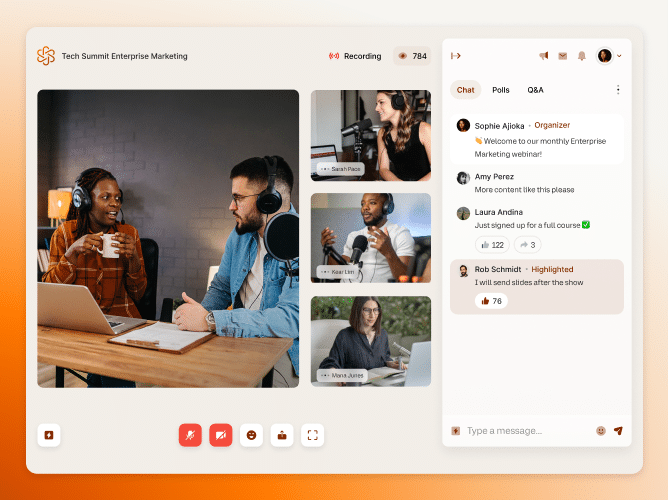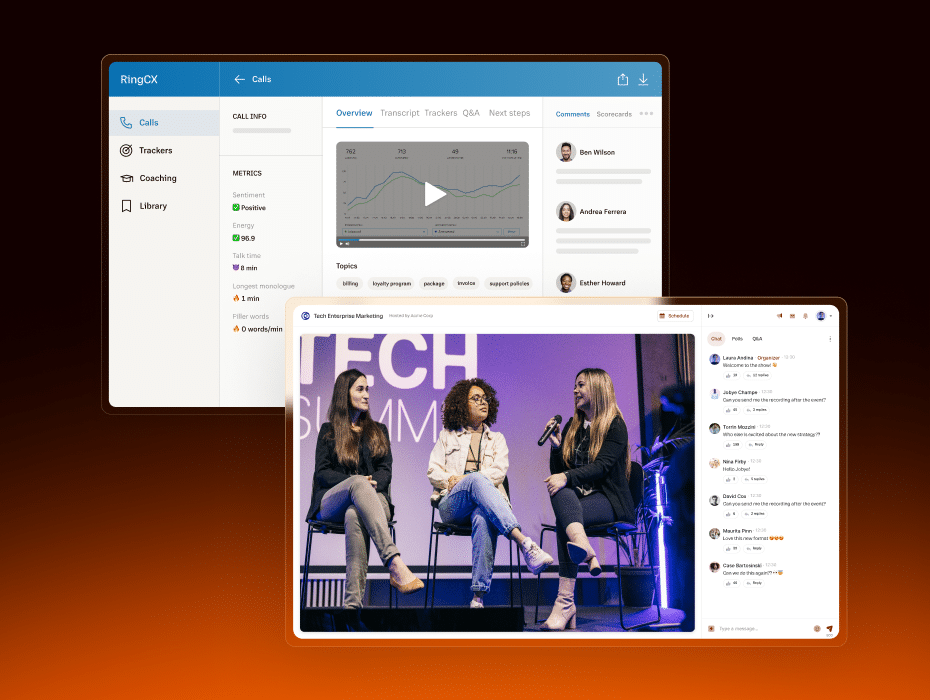In the ever-shifting tech landscape, strategy drives technology selection. But in the world of events, technology not only has to serve the strategy, but flex to meet ever-changing tactics. On a moment’s notice, event marketers often have to switch event formats to suit audience demand, or perceived business risks. A live event may shift to hybrid, an in-person event may move to virtual. The tactical requirements of each are incredibly different.
Now, more than ever before, event marketing strategies are evolving because of flexible work, travel or carbon-use restrictions, and calls for more accessibility and inclusivity to increase demand generation. Event planners have adaptability in their DNA. Their legacy event tools? Not so much.
Event planners and marketers need solutions capable of supporting various event marketing formats — smarter apps built to scale up or down to support everything from weekly webinars to multi-day conferences. With that, event and marketing teams can avoid ballooning budgets and organizational stress from getting their old software to perform new tricks.
Fortunately, all signs suggest that 2024 is the year that event marketing technology finally matches the industry’s rising expectations and needs. AI is driving a significant impact on event tech, and we predict it will improve user experiences for event attendees, marketers, speakers and more. Here are four trends that will transform events — sometimes in unexpected ways — in 2024.
🚀 Need help leveling up your events this year?
Trend 1: Platforms will support every event format and content style
Event marketers know that pulling off a memorable event requires thoughtful planning and intelligent technology.The catch? Many legacy event platforms fall short when it comes to optimizing for omnichannel marketing – a crucial need. Now, organizations are increasingly incorporating pre-recorded segments, often referred to as “simulive” into their mix. But here’s the kicker – whether it’s live or not, all the content should feel live complete with engagement and interaction to wow the audience.
Most event technology platforms struggle to seamlessly blend live and pre-recorded segments, creating that TV-show-like experience without blowing the budget on production costs. That’s no small feat.
In 2024, event platforms will adapt to serve the following five scenarios seamlessly:
- Broadcast/Simulive: These events are designed for in-person attendees but are delivered by a simple live stream or on-demand with in-person recording and live streaming. Use case: a product launch.
- Live studio: Speakers perform to a small, in-person audience but a wider group of virtual attendees, like a live TV show. Use case: A major announcement.
- Simultaneous: A true hybrid event happens when in-person and virtual audiences attend a live event simultaneously, and all attendees see the same content and can interact. Use case: Conference keynotes and sessions.
- Hub-and-Spoke: A more complex event featuring a hub where some presenters and attendees are based and a series of spoke locations with smaller groups of attendees and speakers — and everyone can interact. Use case: Global Sales Kickoff, Large Customer/Partner events, Special events; could have multiple time zones or languages.
- Onsite: These are the traditional gatherings where attendees gather in person, networking, learning, and engaging without the need for virtual components. However, in today’s rapidly changing world, having the flexibility to pivot to streaming at short notice is essential. Use case: a primary networking event.
Trend 2: AI will drive increased engagement through personalization for attendees
Personalization, a cornerstone in marketing strategies, has evolved beyond web pages and emails, making its mark in the realm of events. AI is set to revolutionize personalization features, taking engagement to new heights and immersing attendees in an unparalleled user experience.
How AI enhances attendee experience:
- Tailored sessions: In a sea of sessions and speakers at large conferences, AI steps in to analyze attendee profiles and recommend the most relevant content. This not only saves attendees significant time but also enhances the likelihood of them finding real value in the event.
- Smart networking: Leveraging user profile, interests, and content engagement, platforms powered by AI can suggest valuable connections with other attendees. Given that a significant percentage of event attendees are there for networking, these smart matching algorithms help forge invaluable connections, contributing to a more fulfilling event experience.
- Targeted follow-up: Go beyond generic post-event communications. With targeted follow-up, leverage data insights to tailor messages specifically to each attendee. Whether it’s personalized content recommendations, exclusive offers, or relevant resources, make every post-event interaction meaningful and impactful.
Trend 3: AI will drive increased productivity through automation for organizers
In the fast-paced world of event organization, efficiency is key. Enter the third trend: AI’s transformative impact on productivity through automation. As event organizers navigate intricate logistics and juggle numerous tasks, AI steps in as a formidable ally, streamlining processes, reducing manual efforts, and paving the way for organizers to focus on what truly matters – crafting unforgettable and seamless event experiences.
How AI unlocks new productivity levels for event organizers:
- High quality copywriting: New native AI writing tools can assist event marketers and speakers in crafting compelling copy that not only generates pre-event buzz but also fuels demand.
- Auto-generated video clips: Post-event marketing will get a whole lot simpler with AI-powered video editors that automatically churn out attention-grabbing, bite-sized clips tailored for the channels you care about. Cut the hours spent replaying your content and identifying key moments and repurpose your event content with a few simple clicks.
- Q&A categorization: For speakers and moderators, AI enables event teams to categorize audience questions in real-time during live Q&A sessions.
- Sentiment analysis: Gain deeper insights into attendee experiences with sentiment analysis powered by AI. Understand the emotional pulse of your audience through real-=time data, allowing you to tailor your event strategies and content based on the collective sentiment.
- Targeted follow-ups: Personalize your post-event engagement with targeted follow up strategies. AI comes into play by analyzing attendee data, enabling you to tailor your follow up communications. Whether it’s sending personalized content recommendations, exclusive offers, or relevant resources, AI-drive targeted follow up ensures that your post-event interactions are not just timely but also impactful.
Trend 4: Event platforms will offer deeper, more thoughtful app integrations
Event marketers are witnessing a paradigm shift in the integration landscape. Gone are the days of surface-level data exchanges; instead, we’re entering an era of deeper, more thoughtful connections between event software platforms and the app integrations that empower organizers to create fully bespoke experiences.
Picture a world where event management and CRM tools seamlessly intertwine. Facilitating not just data flow but holistic event planning and execution. From bi-directional updates that keep both systems in sync, to nuanced integrations that anticipate and fulfill organizers’ needs, the future of app integrations will change the way events are planned, executed and analyzed.
But better yet, they will also change the way attendees experience an event.
- APIs (application programming interfaces): Propel event teams into a future where customization knows no bounds. With APIs, event marketers can envision a landscape where tailored products and services seamlessly integrate into their event tools. Simplified integration processes promise swift deployment, freeing marketers from costly and time-consuming IT intervention.
- Direct Connect techniques and enhancements, such as field maps or data mapping out of the box, usher in a new era of self-service empowerment for event marketers.Picture marketers navigating their event data landscape effortlessly, utilizing field mapping techniques to seamlessly integrate and analyze data in real-time. This shift towards self-sufficiency fosters agility, allowing marketers to adapt and innovate at lightning speed.
- App Stores within modern event marketing platforms are revolutionizing customization with curated collections of products that are tailored to elevate attendee experiences and streamline marketer workflows. From interactive polls to immersive collaboration tools and engaging quizzes, event marketers can unlock new productivity and engagement levels in their events.
As we traverse the ever-evolving event marketing landscape, the influence of AI emerges as a transformative powerhouse. From streamlining attendee experiences through personalized journeys to automating tasks for event organizers, AI is reshaping the very fabric of events.
In this dynamic landscape, event marketers aren’t just planners; they’re curators of unforgettable experiences. AI isn’t merely a technological tool but a companion, enhancing attendee engagement, automating processes, and crafting events that transcend the ordinary. As we step into the future of event marketing, each trend represents a stride towards a landscape were
I’m excited to expand on these topics in future posts so stay tuned.
Originally published Feb 29, 2024





